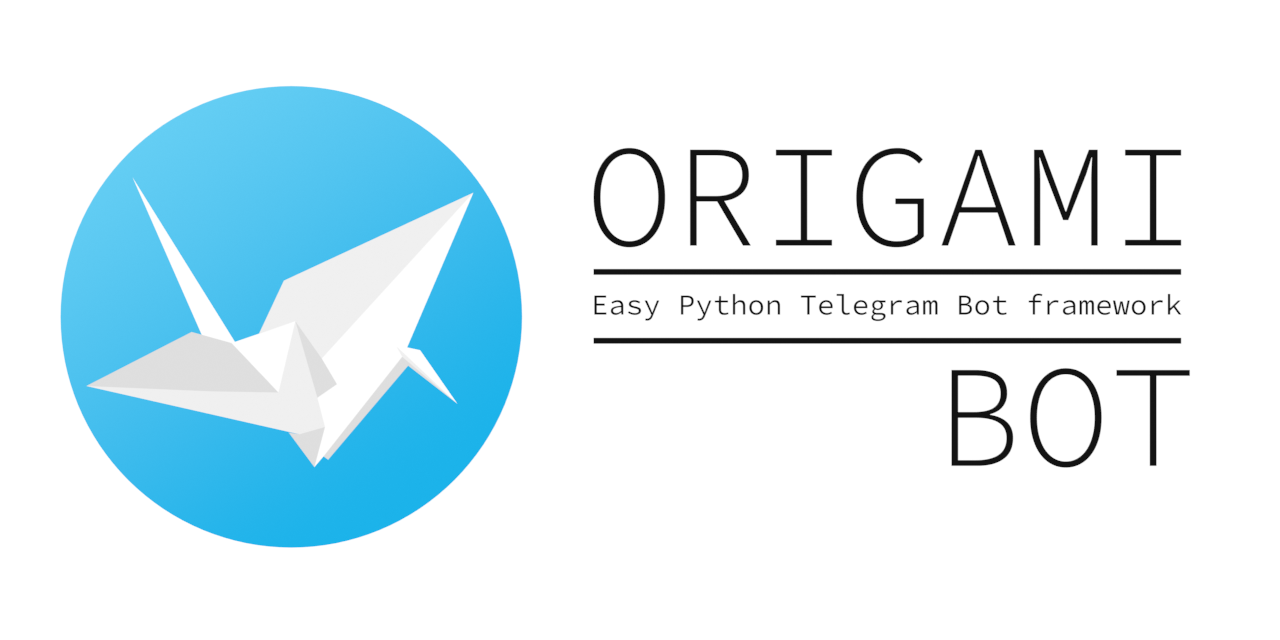Library for creating bots for telegram with Python.
Project description
Library for creating bots for telegram with Python.
OrigamiBot aims to make development of Telegram bots as easy and flexible as possible.
Installation
Origamibot is published in PyPI, so it can be installed with one simple command:
pip install origamibot
Basic concepts
OrigamiBot class is thing that will get updates form the server and dispatch them to your command holders and event listeners.
- Command Holder is a custom class that you create that exposes its methods as commands for bot
command holder can be attached to bot using
bot.add_commands(your_command_holder_class()) - Event listener is a class that inherits from
origamibot.util.Listenerand performs some actions on certain events(when itson_<something>methods are called from OrigamiBot). Event listener can be added to bot withbot.add_listener(your_listener_object)
Usage example
Here goes a simple example of a bot:
from sys import argv
from time import sleep
from origamibot import OrigamiBot as Bot
from origamibot.listener import Listener
class BotsCommands:
def __init__(self, bot: Bot): # Can initialize however you like
self.bot = bot
def start(self, message): # /start command
self.bot.send_message(
message.chat.id,
'Hello user!\nThis is an example bot.')
def echo(self, message, value: str): # /echo [value: str] command
self.bot.send_message(
message.chat.id,
value
)
def add(self, message, a: float, b: float): # /add [a: float] [b: float]
self.bot.send_message(
message.chat.id,
str(a + b)
)
def _not_a_command(self): # This method not considered a command
print('I am not a command')
class MessageListener(Listener): # Event listener must inherit Listener
def __init__(self, bot):
self.bot = bot
self.m_count = 0
def on_message(self, message): # called on every message
self.m_count += 1
print(f'Total messages: {self.m_count}')
def on_command_failure(self, message, err=None): # When command fails
if err is None:
self.bot.send_message(message.chat.id,
'Command failed to bind arguments!')
else:
self.bot.send_message(message.chat.id,
'Error in command:\n{err}')
if __name__ == '__main__':
token = (argv[1] if len(argv) > 1 else input('Enter bot token: '))
bot = Bot(token) # Create instance of OrigamiBot class
# Add an event listener
bot.add_listener(MessageListener(bot))
# Add a command holder
bot.add_commands(BotsCommands(bot))
# We can add as many command holders
# and event listeners as we like
bot.start() # start bot's threads
while True:
sleep(1)
# Can also do some useful work i main thread
# Like autoposting to channels for example
Commands are added as methods of an object(be it class or instance of it), if their names don't start with _ which makes it possible to also contain some utility functions inside command container.
For the command to be called two conditions must be met:
- command name must match with method name
- command's arguments must match signature of a method
Method signature supports any number of arguments with simple typing(str, int, float, bool) or without a typing(in this case all arguments are strings by default), as well as variable number of arguments *args. More complex types(as lists, tuples, custom object classes) are not supported, as bot does not know how to parse them, and I don't want to enforce my own parsing algorithm, but bot will still attempt to convert it like cls(argument), but a correct result is not guaranteed.
Boolean values are considered True if their string representation is in
{'True', 'true', '1'}, and False if in{'False', 'false', '0'}
Project details
Release history Release notifications | RSS feed
Download files
Download the file for your platform. If you're not sure which to choose, learn more about installing packages.
Source Distribution
Built Distribution
File details
Details for the file origamibot-1.0.0.tar.gz.
File metadata
- Download URL: origamibot-1.0.0.tar.gz
- Upload date:
- Size: 24.3 kB
- Tags: Source
- Uploaded using Trusted Publishing? No
- Uploaded via: twine/3.2.0 pkginfo/1.5.0.1 requests/2.24.0 setuptools/41.2.0 requests-toolbelt/0.9.1 tqdm/4.48.0 CPython/3.8.3
File hashes
| Algorithm | Hash digest | |
|---|---|---|
| SHA256 | dda6fba5538999aa01520abcad9099aea735e97df896813911b0bdf8d4127abf |
|
| MD5 | 7a96b1ba5743a6d5e5fd33fc2cf3b004 |
|
| BLAKE2b-256 | 525e5b8eaaf176ca5525e813c374e5a5ea6b6f80aab610570e5ea4e4308b0efd |
File details
Details for the file origamibot-1.0.0-py3-none-any.whl.
File metadata
- Download URL: origamibot-1.0.0-py3-none-any.whl
- Upload date:
- Size: 25.9 kB
- Tags: Python 3
- Uploaded using Trusted Publishing? No
- Uploaded via: twine/3.2.0 pkginfo/1.5.0.1 requests/2.24.0 setuptools/41.2.0 requests-toolbelt/0.9.1 tqdm/4.48.0 CPython/3.8.3
File hashes
| Algorithm | Hash digest | |
|---|---|---|
| SHA256 | 3f4ceef6972b9930c75ba22731edbcc13b5bbbc886b0a3b95f82696c9638fd51 |
|
| MD5 | 8dfeb0a1441cce559542fac501505637 |
|
| BLAKE2b-256 | 831b470df9922972c0953e7a74db02f1068a2feb28fea4d43487123cbe676b96 |













